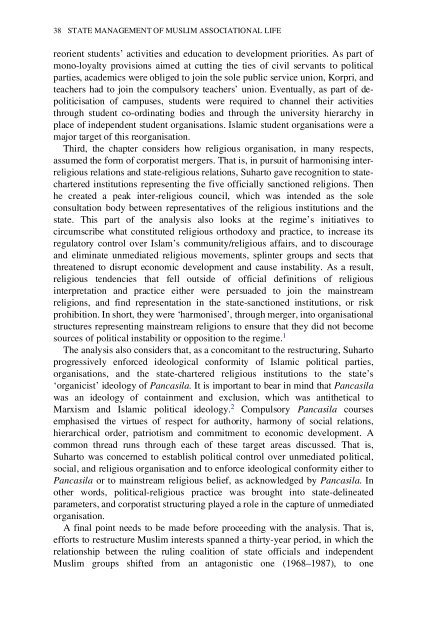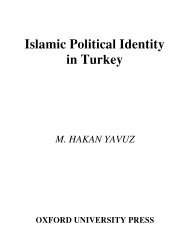You also want an ePaper? Increase the reach of your titles
YUMPU automatically turns print PDFs into web optimized ePapers that Google loves.
38 STATE MANAGEMENT OF MUSLIM ASSOCIATIONAL LIFEreorient students’ activities <strong>and</strong> education to development priorities. As part ofmono-loyalty provisions aimed at cutt<strong>in</strong>g the ties of civil servants to politicalparties, academics were obliged to jo<strong>in</strong> the sole public service union, Korpri, <strong>and</strong>teachers had to jo<strong>in</strong> the compulsory teachers’ union. Eventually, as part of depoliticisationof campuses, students were required to channel their activitiesthrough student co-ord<strong>in</strong>at<strong>in</strong>g bodies <strong>and</strong> through the university hierarchy <strong>in</strong>place of <strong>in</strong>dependent student organisations. <strong>Islam</strong>ic student organisations were amajor target of this reorganisation.Third, the chapter considers how religious organisation, <strong>in</strong> many respects,assumed the form of corporatist mergers. That is, <strong>in</strong> pursuit of harmonis<strong>in</strong>g <strong>in</strong>terreligiousrelations <strong>and</strong> state-religious relations, Suharto gave recognition to statechartered<strong>in</strong>stitutions represent<strong>in</strong>g the five officially sanctioned religions. Thenhe created a peak <strong>in</strong>ter-religious council, which was <strong>in</strong>tended as the soleconsultation body between representatives of the religious <strong>in</strong>stitutions <strong>and</strong> thestate. This part of the analysis also looks at the regime’s <strong>in</strong>itiatives tocircumscribe what constituted religious orthodoxy <strong>and</strong> practice, to <strong>in</strong>crease itsregulatory control over <strong>Islam</strong>’s community/religious affairs, <strong>and</strong> to discourage<strong>and</strong> elim<strong>in</strong>ate unmediated religious movements, spl<strong>in</strong>ter groups <strong>and</strong> sects thatthreatened to disrupt economic development <strong>and</strong> cause <strong>in</strong>stability. As a result,religious tendencies that fell outside of official def<strong>in</strong>itions of religious<strong>in</strong>terpretation <strong>and</strong> practice either were persuaded to jo<strong>in</strong> the ma<strong>in</strong>streamreligions, <strong>and</strong> f<strong>in</strong>d representation <strong>in</strong> the state-sanctioned <strong>in</strong>stitutions, or riskprohibition. In short, they were ‘harmonised’, through merger, <strong>in</strong>to organisationalstructures represent<strong>in</strong>g ma<strong>in</strong>stream religions to ensure that they did not becomesources of political <strong>in</strong>stability or opposition to the regime. 1The analysis also considers that, as a concomitant to the restructur<strong>in</strong>g, Suhartoprogressively enforced ideological conformity of <strong>Islam</strong>ic political parties,organisations, <strong>and</strong> the state-chartered religious <strong>in</strong>stitutions to the state’s‘organicist’ ideology of Pancasila. It is important to bear <strong>in</strong> m<strong>in</strong>d that Pancasilawas an ideology of conta<strong>in</strong>ment <strong>and</strong> exclusion, which was antithetical toMarxism <strong>and</strong> <strong>Islam</strong>ic political ideology. 2 Compulsory Pancasila coursesemphasised the virtues of respect for authority, harmony of social relations,hierarchical order, patriotism <strong>and</strong> commitment to economic development. Acommon thread runs through each of these target areas discussed. That is,Suharto was concerned to establish political control over unmediated political,social, <strong>and</strong> religious organisation <strong>and</strong> to enforce ideological conformity either toPancasila or to ma<strong>in</strong>stream religious belief, as acknowledged by Pancasila. Inother words, political-religious practice was brought <strong>in</strong>to state-del<strong>in</strong>eatedparameters, <strong>and</strong> corporatist structur<strong>in</strong>g played a role <strong>in</strong> the capture of unmediatedorganisation.A f<strong>in</strong>al po<strong>in</strong>t needs to be made before proceed<strong>in</strong>g with the analysis. That is,efforts to restructure Muslim <strong>in</strong>terests spanned a thirty-year period, <strong>in</strong> which therelationship between the rul<strong>in</strong>g coalition of state officials <strong>and</strong> <strong>in</strong>dependentMuslim groups shifted from an antagonistic one (1968–1987), to one




